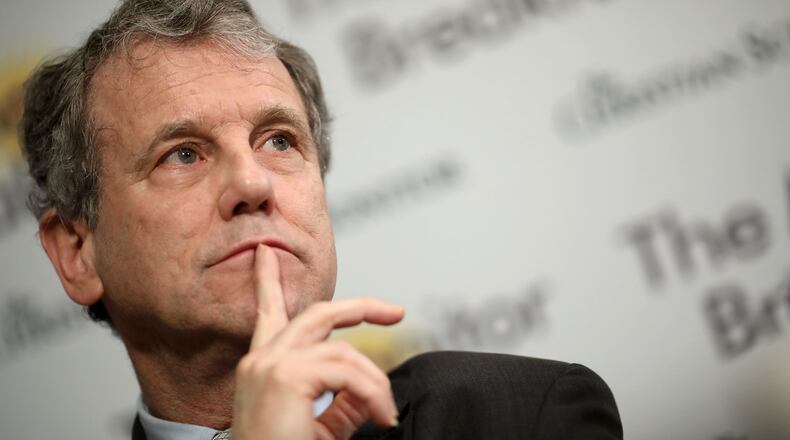In addition, Sanders, Harris, Booker, and Gillibrand have all endorsed what is known as the Green New Deal which would dramatically transform the U.S. economy from fossil fuels to clean burning energy at a cost nobody has yet put a price tag on.
But the charge to the left with bold initiatives costing trillions of dollars during the next decade creates an opportunity for Brown to craft an appeal that costs less and might resonate with independents and moderate Democrats in the New Hampshire primary and the general election nationwide.
Brown did not endorse the Green New Deal unveiled this month by congressional Democrats and has rejected Sanders’ Medicare for all plan which scraps private insurance. Brown warned this month on CNN “you don’t wipe away” the current health system and “then come up with something new that will take time and cause people angst and anguish to move to a different plan.”
“Sherrod has been a progressive his whole career but he’s never been radical,” said James Ruvolo, former chairman of the Ohio Democratic Party. “He’s always someone who looks to get something done in a progressive way.”
“I think this is really Sherrod,” Ruvolo said. “And it is a path to the nomination. Certainly in a general election his message will be better than Bernie Sanders.”
Dayton Mayor Nan Whaley, who heads a group urging Brown to run, said “Sherrod is keeping his eyes on what is needed to beat Donald Trump.”
A prime reason Democrats have shed their reluctance to offer big spending plans is President Trump. In the 2016 campaign, he promised to build a wall along the Mexican border and make Mexico pay for it, cut taxes, and balance the federal budget without trimming Medicare or Social Security.
Instead, Trump and Republicans have displayed little interest in controlling federal debt. Trump signed in 2017 a $1.5 trillion, 10-year tax cut which was not paid for by spending reductions.
Independent studies show that providing Medicare for everyone would cost anywhere between $25 trillion and $32 trillion during the next decade. Nobody has offered a cost for the Green New Deal while making college tuition free to students could cost another $700 billion during the next 10 years.
“There is a lot of thinking on the Democratic side that Republicans didn’t rein in their wish lists on tax cuts, so why not go into the next election with a big agenda,” said Robert Bixby, executive director of the Washington-based Concord Coalition, which favors reducing the deficit.
A longtime former Senate Republican staffer said “those ideas will not be paid for by a tax on millionaires. Sooner or late somebody is going to total up the costs of all these things and it’s going to be a mind-boggling number.”
Sanders and Harris have called for scrapping the current health system where 156 million Americans receive private health insurance through their employers.
Instead, all Americans would be covered by a government system modeled in part on Medicare, which provides health coverage to 56 million seniors. Gillibrand, Warren and Booker have signed on to Medicare for all, but have not ruled out a role for private insurance.
“When you look at these plans, the two things that stand out are the sheer magnitude of the tax increases that would be required and many people would pay a lot more in new taxes as opposed to premiums,” said Kenneth Thorpe, a professor of health policy at Emory University who served in the Clinton administration.
By contrast, Brown prefers to improve the 2010 Affordable Care Act known as Obamacare, which dramatically slashed the number of Americans without health coverage through federally subsidized private individual plans and expansion of Medicaid, a joint state and federal program which provides health care to low-income people.
In addition, Brown favors allowing Americans older than age 50 to buy into Medicare. That move could add millions more people to the government health plan, but would likely reduce the number of Americans without health coverage.
“There is the opportunity to build on what we have and would cost a fraction of what we are talking and it wouldn’t be as disruptive,” Thorpe said.
Brown’s ideas are not without cost. Allowing people older than 50 to buy into Medicare almost certainly will increase the program’s size at a time when its future solvency is in doubt.
Just last year, the Social Security and Medicare Board of Trustees concluded that without any changes, Medicare Part A, which covers hospital costs, would have to trim payments to health providers by nine percent in 2026.
In addition, those favoring lower deficits are alarmed because the non-partisan Congressional Budget Office projects the federal government will add more than $10 trillion to the debt held by the public, which is money owed to private and foreign investors who buy treasury bills and notes.
“We start into this process in a deep hole,” Bixby said. “Even if everything is paid for, we are on an unsustainable course. So going deeper and deeper in debt with new programs makes that even more unsustainable.”
In past years, nobody would question Brown’s progressive credentials. From the time he first entered politics nearly four decades ago, he has been a staunch supporter of organized labor, loves to bash Wall Street, and rarely talks about deficits.
“The idea that I find incredibly laughable is Sherrod Brown isn’t liberal or progressive in this day and age,” said Jim Manley, a onetime adviser to former Senate Majority Leader Harry Reid, D-Nevada. “For any activist wanting to make something like Medicare for all a litmus test at this point in time, they need to have their head examined.”
About the Author
